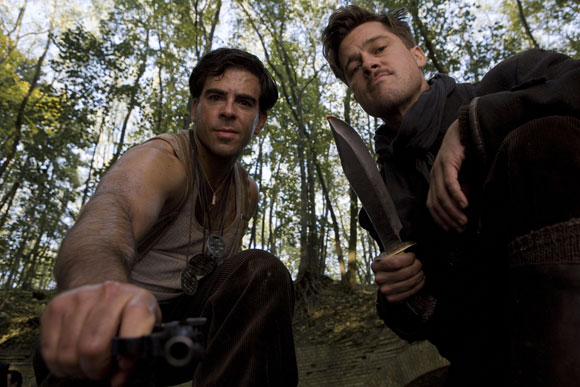Inglourious Basterds

Inglourious Basterds was released in theaters nationwide on August 21, 2009, the following is a retroactive review:
In an early shot, Julie (Tina Rodriguez), one of dairy farmer Perrier LaPadite’s (Denis Minochet) daughters hangs linens on a clotheswire. The camera’s focus on the deliberately placed strokes of her hand across the sheet telegraphs obligatory replication before we even recognize that writer/director Quentin Tarantino has lifted a scene from Sergio Leone’s Once Upon a Time in the West—Nazis on motorcycles standing in for desperados on horseback; Mr. Minochet in the McBain role. The title card “Once Upon a Time in Nazi-Occupied France” is superfluous, but to be expected of Mr. Tarantino, who delights in regaling us with his movie store clerk mastery of insipid trivia.
Enter SS Colonel Hans Landa (Christoph Waltz), the “Jew Hunter,” so named for his cinematically-cliché prescience. Convinced that LaPadite is harboring Jews, Col. Landa breaks into a laborious soliloquy on the hiding places of hawks versus rats. I wasn’t aware hawks had much to hide from, but never mind. His foreknowledge withheld, the scene builds tension for minutes on end. Has it been done? Yes. Does it nonetheless generate white-knuckled suspense? Absolutely. Mr. Waltz has created a smug monster not unlike that of Ralph Fiennes’ Amon Goethe in Schindler’s List. But there was nothing remotely comical about Goethe. Fear kept a constant level. Mr. Waltz’s dynamic performance contrasts satirical and dramatic hues, effectively charismatic and repulsive at once.
The film is a fictitious account of an assassin squad of Jewish-American soldiers handpicked by Lt. Aldo Raine (Brad Pitt), nicknamed “The Basterds,” to infiltrate or ambush and kill German soldiers behind enemy lines in World War II. Unlike most of Mr. Tarantino’s films, Inglourious Basterds has a mostly linear chronology. To tell two stories and connect them without tritely rearranging the narrative, and maintain suspense for two hours and thirty-three minutes is a genuine achievement for him even if riddled with the usual jump cuts, self-aware dialogue and movie trivia—among other marks of his brand.
The second plot involves Shosanna Dreyfus (Mélanie Laurent), an escapee from the film’s initial massacre, who inherited a movie theater. In a completely random introduction—plot machination—she is pestered for a date by a young German soldier, Frederick Zoller (Daniel Brühl). He turns out to be a war hero and a movie star—analogue of Audie Murphy, the most decorated World War II veteran and star of his own autobiography, To Hell and Back. Private Zoller convinces Dr. Josef Goebbels (Sylvester Groth), the director of the propaganda film in which Zoller stars, his movie should be premiered at Shosanna’s theater. Seething yet from the massacre of her family, Dreyfus hatches a plan to eliminate most of the Nazi party’s high command. Complicating matters, not only does the Basterds’ operation lead them to the same conclusion, but the adept Col. Landa is always only a step behind the saboteurs. It’s rather obvious what the outcome will be, if you know Mr. Tarantino’s predilection toward female revenge stories. How it unfolds is of greater interest.
In those satirical characterizations, seemingly endless dialogues, recycled musical cues and ludicrously-stylized bloodbaths we receive our sacrament—cobbled-together adventure and mayhem from my generation’s favorite movie nerd. The movie is nothing more than that, nor need it be. Mr. Tarantino’s evolution as a film maker is such that the shot-by-shot plagiarism and film school bore has somehow morphed into his own lexicon. In his prior works, replication of technique might have existed for its own sake as in the diffusely lit sequences of Kill Bill parodying Shaw Bros. flicks, or naming a chapter after an obscure, 1968 Elke Sommer film (The Wicked Dreams of Paula Schultz). Here, Mr. Tarantino learns to apply those years of mimicry with purpose. Consider Col. Landa’s protracted request to converse in English with Perrier. While poking fun at American period pieces which often begin in another language only to switch to English in the first scene, the move obfuscates Landa’s intentions from the Jews hiding under the floorboards. Later, a shot continues for a beat or two, focusing on Lt. Raine’s solitary, abashed glances after repeatedly fumbling Italian pronunciation before the multi-lingual Col. Landa. The aforementioned reliance on seeming plot omniscience is used in another scene ending in a standoff. But unlike the languid ramblings of Pulp Fiction, the scene’s reams of dialogue ratchet the tension near, but not past, exasperation. The payoff arrives before you think to glance at your watch, despite a good twenty minutes having passed.
Only Private Zoller regrets killing so many. Yet the thought is abandoned just before his baser instincts return. The film is pure vengeance without nuance or intellect—moral conundrums unexamined. Mr. Tarantino has a talent for such action pieces, devoid of sophistry. As Pauline Kael spoke of directors being “Generals in the arts,” he cannot be bothered with such questions on the way to his big vision. Other than kicky violence or oddball characters including the treacherous Sgt. Hugo Stiglitz (Til Schweiger) whose reputation so precedes him as to warrant his own title card, if there’s a reason Tarantino’s approach works here it is the reliably-despicable Nazis. They’re the ultimate contrivance for conscience-free killing. Could it have worked with a different antagonist? Perhaps, but it doesn’t hurt to vacate our faculties in the service of action, provided we don’t fool ourselves into believing that Quentin Tarantino aims higher than Michael Bay.
 Inglourious Basterds • Dolby® Digital surround sound in select theatres • Aspect Ratio: 2.39:1 • Running Time: 153 Minutes • MPAA Rating: R for strong graphic violence, language and brief sexuality. • Distributed by The Weinstein Company
Inglourious Basterds • Dolby® Digital surround sound in select theatres • Aspect Ratio: 2.39:1 • Running Time: 153 Minutes • MPAA Rating: R for strong graphic violence, language and brief sexuality. • Distributed by The Weinstein Company